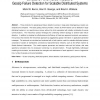Free Online Productivity Tools
i2Speak
i2Symbol
i2OCR
iTex2Img
iWeb2Print
iWeb2Shot
i2Type
iPdf2Split
iPdf2Merge
i2Bopomofo
i2Arabic
i2Style
i2Image
i2PDF
iLatex2Rtf
Sci2ools
115
click to vote
CLUSTER
1999
IEEE
1999
IEEE
Simulative performance analysis of gossip failure detection for scalable distributed systems
Three protocols for gossip-based failure detection services in large-scale heterogeneous clusters are analyzed and compared. The basic gossip protocol provides a means by which failures can be detected in large distributed systems in an asynchronous manner without the limits associated with reliable multicasting for group communications. The hierarchical protocol leverages the underlying network topology to achieve faster failure detection. In addition to studying the effectiveness and efficiency of these two agreement protocols, we propose a third protocol that extends the hierarchical approach by piggybacking gossip information on application-generated messages. The protocols are simulated and evaluated with a fault-injection model for scalable distributed systems comprised of clusters of workstations connected by high-performance networks, such as the CPlant machine at Sandia National Laboratories. The model supports permanent and transient node and link failures, with rates specifi...
CLUSTER 1999 | Distributed And Parallel Computing | Distributed Systems | Failure Detection | Large-scale Heterogeneous Clusters |
Related Content
| Added | 22 Dec 2010 |
| Updated | 22 Dec 2010 |
| Type | Journal |
| Year | 1999 |
| Where | CLUSTER |
| Authors | Mark W. Burns, Alan D. George, Bradley A. Wallace |
Comments (0)

